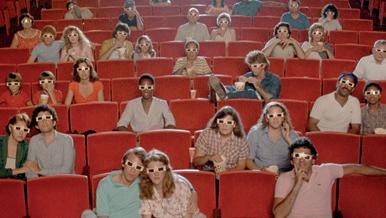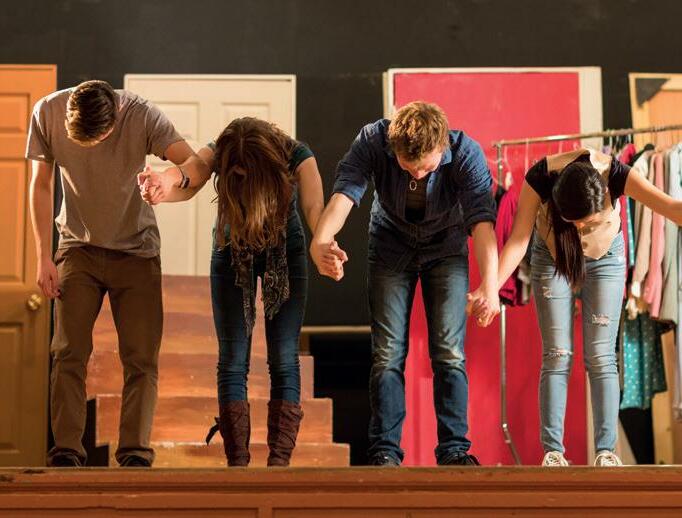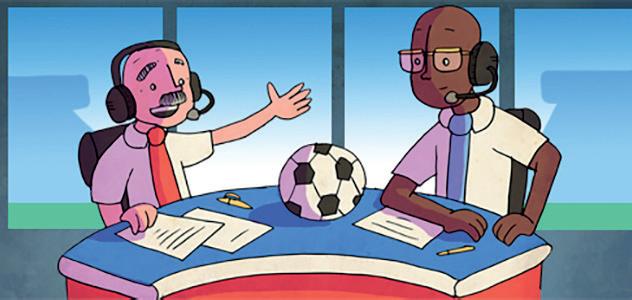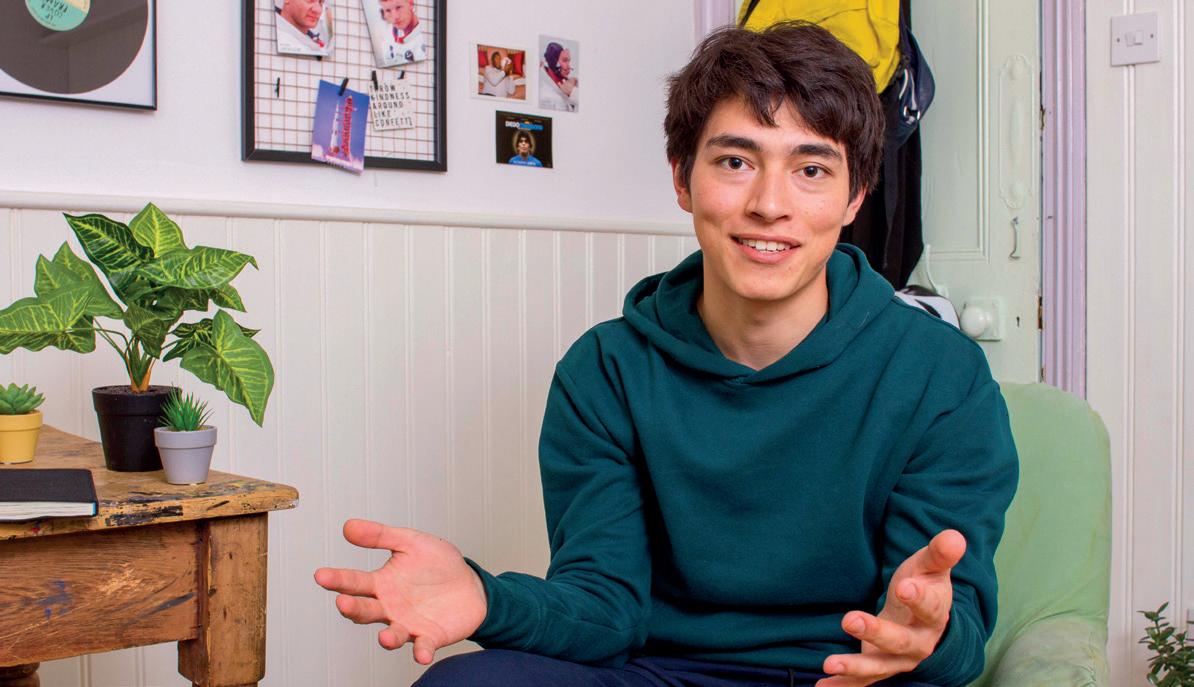
Welcome p 4 A Introducing yourself; Asking questions; The weather; Families B Meeting people; Irregular past participles; Losing things; Furniture C Buying and talking about food; In a restaurant; Shops; Things you have to do D Plans and arrangements; Sports and sport verbs; Travel plans
FUNCTIONS & SPEAKING GRAMMAR VOCABULARY
Unit 1 Incredible people p 12
Talking about things you have and haven’t done Developing Speaking: Offering encouragement
Present perfect with just, already and yet Present perfect vs. past simple
Personality adjectives Collocations
Asking and giving / refusing permission to do something Role play: Asking permission
Present perfect with for and since a, an, the or no article
Life competencies: Recognising others’ good work , Culture: Schools with a difference , Review
Unit 3 On the screen p 30
Unit 4 Online life p 38
Comparing things and actions
Developing Speaking: Asking for and offering help
Giving advice
School subjects Verbs about thinking
WordWise: Phrases with just Unit 2 A good education p 20
Comparative and superlative adjectives (review) (not) as … as comparatives Making a comparison stronger or weaker Adverbs and comparative adverbs
Indefinite pronouns (everyone, no one, someone, etc.) all / some / none / any of them should(n’t), had better, ought to
Life competencies: Achieving your goals , Culture: From caves to Kindles – how reading has changed , Review
Unit 5 Music to my ears p 48
Unit 6 No planet B p 56
Role play: Helpful suggestions
Developing Speaking: Asking about feelings
Present perfect continuous Present perfect simple vs. present perfect continuous
Expressing surprise and enthusiasm will (not), may (not), might (not) for prediction First conditional unless in first conditional sentences
Life competencies: Managing your money , Culture: Green solutions around the world , Review
Unit 7 The future is now p 66
Unit 8 Science and us p 74
Checking information
Developing Speaking: Agreeing
Talking about past habits
Talking about imaginary situations
Talking about scientific discoveries
Future forms Question tags Nor, neither and so
Past simple vs. past continuous (review) used to Second conditional I wish
Life competencies: Being flexible , Culture: Amazing inventions from ancient civilizations , Review
Unit 9 Working week p 84
Unit 10
Mind and body p 92
Developing Speaking: Accepting and refusing offers and invitations
Role play: Inviting friends to join you
Talking about your health
The passive (present simple, past simple, present continuous, present perfect)
Past perfect simple
Past perfect continuous Past perfect simple vs. past perfect continuous
Life competencies: Taking responsibility for your actions , Culture: Keep in shape … without going to the gym , Review
Unit 11 Breaking news p 102
Unit 12 Rules and regulations p 110
Reporting what someone has said
Developing Speaking: Expressing feelings: anger
Talking about permission
Following and giving simple instructions
Reported statements Verb patterns: object + infinitive
be allowed to / let Third conditional
Life competencies: Being assertive , Culture: Strange laws from around the world , Review
Types of films
WordWise: Expressions with get Types of TV programmes
IT terms
Language for giving advice
Making music Musical instruments WordWise: Phrasal verbs with out
The environment Verbs to talk about energy
Future time expressions Arranging a party WordWise: Phrases with about
Direction and movement Science
Jobs work as / in / for; work vs. job WordWise: Time expressions with in
Time linkers Illness: collocations
Fun More verbs with object + infinitive WordWise: Expressions with make
Discipline Consequences and reasons
2
CONTENTS
PRONUNCIATION THINK!
SKILLS
Intonation and sentence stress Values: Human qualities Reading Online survey responses: Who do you admire most? Article: Human moles
Writing A short passage about someone you admire Listening Guessing game
Word stress Values: Learning for life Train to Think Learning about texts
B1 Preliminary for Schools Exam practice
Reading Article: The loneliest schoolboy in Britain Article: The power of ‘yet’
Writing An email describing your school routine Listening Conversation about a summer activity list
Words ending in /ə/ Values: Preconceived ideas Reading Article: A new kind of superhero Article: The history of watching TV Writing A paragraph about your TV habits Listening Interview with a teenage filmmaker
The short /ʌ/ vowel sound Values: Responsible online behaviour Train to Think Logical sequencing
B1 Preliminary for Schools Exam practice
been: strong /bιːn/ and weak /bɪn/ Values: Following your dreams
/f/, /v/, /b/ consonant sounds Values: Caring for the world Train to Think Different perspectives
B1 Preliminary for Schools Exam practice
Intonation of question tags Values: Believe in a better future
Reading Article: Leaving footprints Short texts: Different types of messages
Writing A web page giving advice Listening Conversation about falling for online scams
Reading Magazine article: A bright star Article: The future of live music
Writing The story of your favourite band Listening Interviews about music
Reading Magazine article: Hot topic: saving the Earth Leaflet: Energy matters
Writing An article for the school magazine Listening Interview about a town project
Reading Newspaper article: Today’s world Group chat: Arranging a party
Writing An invitation to a party Listening Interview with a singer and a journalist
The /juː/ sound Values: How science helps people Train to Think Using criteria
B1 Preliminary for Schools Exam practice
/tʃ/ and /dʒ/ consonant sounds Values: What’s important in a job?
/tʃ/ and /ʃ/ consonant sounds Values: Never give up Train to Think Logical conclusions
B1 Preliminary for Schools Exam practice
Intonation: rude or polite? Values: Reacting to jokes
Reading Magazine article: Curious minds Web forum: What invention or discovery would make your life better?
Writing A blog entry Listening A science lesson
Reading Article: The perfect job? Article: Technology in the workplace
Writing A short essay about jobs in the future Listening Interview with Marina Stuart
Reading Article: 8,000 birds to see before you die Article: 3D printing – it can change lives
Writing A story Listening Conversation about health and exercise
Reading Article: It’s all fake news Article: The danger of live TV
Writing A news report Listening Profile of an extreme weather journalist
Silent consonants Values: The importance of rules Train to Think Being creative
B1 Preliminary for Schools Exam practice
Reading Article: Hard times to be a kid Website contest: The best 50-word stories
Writing A set of rules Listening The rules of chess
Pronunciation pages 120–121 Get it right! pages 122–126 Speaking activities pages 127–128
3

















comparing things and actions; asking for and offering help GRAMMAR: comparative and superlative adjectives (review); (not) as … as; making a comparison stronger or weaker; adverbs VOCABULARY: types of films; types of TV programmes; expressions with get 3 Watch the video and think: what’s your favourite form of entertainment? 07 SCREEN ON THE READING 1 Match the words in the list with the photos. Write 1–6 in the boxes. 1 concert | 2 cinema | 3 play | 4 sports event 5 TV programme | 6 video game 2 SPEAKING SPEAKING Which of these kinds of entertainment do you like? Tell your partner. 3 SPEAKING SPEAKING Work in small groups. Talk about the things in Exercise 1. Say why people like or don’t like them. Use the words in the list to help you. crowds | enjoyable | expensive friends | fun | interesting | relaxing I think people enjoy going to the cinema because it is relaxing. 4 Look at the pictures and the title of the article on the next page. What do you think the article is about? A a director B an actor C a type of film 5 3.01 Read and listen to the article and check your ideas. 6 Read the article again. Find: 1 two examples of things that influenced Tim Burton 2 the reason people were upset when Burton chose Michael Keaton for Batman 3 two examples of types of film that Burton has made 4 an example of creative work that Burton does apart from directing films A B C D E F 30
OBJECTIVES FUNCTIONS:
A new kind of
SUPERHERO
Tim Burton is one of the most famous American film directors. His most popular films include: Batman (1989), Edward Scissorhands (1990), Batman Returns (1992) and Dumbo (2019). In 1990, he got a Daytime Emmy Award for his cartoon series Beetlejuice and in 1991 he got a Hugo Award for Edward Scissorhands.
Tim grew up watching horror films and cartoons. He read Edgar Allan Poe’s horror stories and he loved drawing. He also made short films in his back garden. After leaving school, Burton studied animation. Then, he got a job at Walt Disney studios. He was a very good animator, but he didn’t draw in the Disney style. So he left Disney and started to make his own films.
One of his most successful films is Batman. At first, people were upset when Tim Burton chose the comedy actor Michael Keaton to play Batman. Batman is a superhero who is taller and stronger than ordinary men, and Michael Keaton was too short. At 1.75 m, he was in fact the shortest actor ever to play Batman. However, the film was very successful and everybody loved Michael Keaton as Batman.
One of Tim Burton’s most interesting characters is Edward Scissorhands. The idea for the character came from a drawing that Burton made in high school. Edward isn’t human and he has got scissors instead of hands. In the film, Johnny Depp plays Edward. However, his character in the film is not as scary as Tim Burton’s original drawing.

In one of his latest films, Dumbo, Dumbo the elephant has got bigger ears than the other elephants and they laugh at him. However, his big ears are an advantage. He can fly. This new film is more exciting than the old Disney film, but the CGI elephant is not as cute as the cartoon elephant in the 1941 film. There are some changes in the plot, but the new film is still as sad as the old one.
Tim Burton has directed many other films, including some of the best-loved children’s stories like Charlie and the Chocolate Factory and Alice in Wonderland. He still produces films today, and sometimes he shows some of his drawings and cartoons at exhibitions around the world.

Preconceived ideas





































7 Read the sentences. How much do you agree with each one? Write a number: 1 (I agree), 2 (I’m not sure) or 3 (I don’t agree).

1 If there is a film about a real-life famous person, the actor should look as much like that person as possible.

2 I won’t go to see a new film if there is an actor in it that I don’t like.














3 Cheap things are never worth buying.

4 There are some shops where I would never buy clothes.
5 It’s crazy not to like someone because of the way they speak.
8 SPEAKING SPEAKING Work in groups. Compare your ideas.


I don’t agree with number 1. It’s impossible to find actors who look the same.
Do you think so? I agree with it. I think they should wear make-up to make them look very similar.
31 UNIT 3 ON THE SCREEN
GRAMMAR
Comparative and superlative adjectives (review)
1 Complete these sentences from the article on page 31 with the correct form of the words in the list.
big | exciting | short | strong | tall
1 Batman is a superhero who is and than ordinary men.
2 At 1.75 m, he was in fact actor to ever play Batman.
3 Dumbo the elephant has got ears than the other elephants.
4 This new film is the old Disney film.
(not) as … as comparatives


2 Look at the examples of (not) as … as to compare things. Answer the questions. Then complete the rule.


His character in the film is not as scary as Tim Burton’s original drawing.
The new film is still as sad as the old one.
1 Which is scarier: the original drawing or the character in the film?



2 Is the new film sadder than the old film?

RULE: When we want to say that two things are (not) the same, we can use (not) 3 + adjective + 4
3 Complete each sentence with your own ideas.
1 a Football isn’t as exciting as skiing . b Football is more exciting than golf
2 a English is easier than b English isn’t as easy as
3 a Watching TV isn’t as good as . b Watching TV is better than .
4 Complete the second sentence so it has the same meaning as the first. Use the word in brackets.
0 Ben’s sister is younger than him. (old) Ben’s sister isn’t as old as him.
1 Travelling by train is faster than travelling by bus. (slow) Travelling by train travelling by bus.
2 Tom is 1.65 m. Sue is 1.65 m, too. (tall) Tom Sue.
3 Dogs are noisier than cats. (quiet) Dogs cats.
4 This mobile phone costs €225. And the bicycle costs €225, too. (expensive) The mobile phone the bicycle.
5 Jo thinks Geography is easier than History. (difficult) Jo thinks Geography History.
6 My room is tidier than yours. (untidy) My room yours.
PRONUNCIATION
Words ending in /ə/ Go to page 120. workbook page 28
Spies in Disguise is an action film.
Types of films 5 Write the types of films in the list under the pictures. action film | animated film | comedy | documentary | horror film romantic comedy (rom com) | science fiction (sci-fi) | thriller
VOCABULARY
6 SPEAKING SPEAKING Can you think of an example of each type of film? Are any of your examples more than one type?
1 2 3 4 5 6 7 8 workbook page 30 32
LISTENING
7 3.04 Listen to Part 1 of an interview. Why is Emma Harding a guest on the radio show?
8 3.05 Listen to Part 2 of the interview.

For each question, choose the correct answer.
1 Emma says that making a Lego film
A takes a lot of time.
B is far easier than you think.
C requires lots of drawing.
2 When she was making the film, Emma
A used her own camera.
B didn’t have any lights.
C had some help from a friend.
3 Emma says that her film is
A 10 seconds long.
B 18 seconds long.



C 20 seconds long.
GRAMMAR
Making a comparison stronger or weaker
9 Read the sentences. Choose the phrase that has a different meaning from the other two. Then complete the rule.
0 Eighteen photos look a lot / much / a little better than ten photos.
1 Together we made the script a little / a lot / a bit better.
2 I’m sure it’s a little / much / far more difficult than it looks.

RULE: Use 3 / 4 / far to make a comparative stronger.

Use a bit / 5 to make a comparative weaker.
10 Rewrite these sentences using the words in brackets.
1 Sharks are more dangerous than dolphins. (a lot)
2 My brother is taller than me. (a bit)
3 My new phone’s better than my old one. (far)
4 Her hair is longer than yours. (a little)
11 Write sentences comparing these things.
Use much / far / a lot or a bit / a little.
0 watching TV / reading a book (interesting / easy)
I think watching TV is a lot more interesting than reading a book – and it’s far easier, too.
1 gorillas / snakes (dangerous / beautiful)
2 English / Art (difficult / interesting)
3 my country / US (big / beautiful)
WordWise: Expressions with get




workbook page 29
12 Look at the sentences from the unit so far. Choose the correct meaning of get in each one.
1 Then you need to get yourself a camera.
2 He got a Daytime Emmy Award for his cartoon series Beetlejuice.
3 I couldn’t wait to get home and tell my mum.
4 I still get emotional now when I think about it. a become b received c arrive d obtain, buy
13 Use a phrase from the list to complete each sentence.
get a drink | get angry | get home got better | got bored | got there
08 UNIT 3 ON THE SCREEN
1 The film was terrible – after 20 minutes, I and fell asleep.
2 I was really late for school – when I , it was already ten o’clock!

3 There’s still a long way to go. I don’t think we’ll before midnight.
4 He was ill for about a week, but then he , I’m happy to say.
5 It was just a joke. Please don’t with me!
6 If you want, we can in that café in the town centre.
14 Match the questions and answers.
1 Let’s go and get a drink.
2 When do you get angry with people?
3 Do you ever get bored watching TV?
4 What time do you get to school?
5 Do you ever get a cold?
a When they say things I don’t like.
b Usually about eight o’clock.
c OK. The shop over there sells water.
d Sometimes – in winter, usually.
e Only when it’s a programme I don’t like.
workbook page 30
5 The film’s more exciting than the book. (much) 33
READING
1 Read the article quickly. Write the titles in the correct spaces 1–4.



A The rise in screen time

B TV as a family activity
C The changing world of TV
D Non-stop drama




THE HISTORY OF watching TV

Television (TV) has been in people’s homes since the 1930s, but our way of watching TV has changed significantly over the years. In the 1950s, families that had TVs, only had one TV set and three channels to choose from. Nowadays, we can watch a TV show on many different devices, anywhere and at any time of the day or night. Consequently, our generation is watching TV more frequently than any other generation before.
TVs were luxury items in the 1950s, and the families that did have one had to sit very close to it as the screens were very small.

Then in the 1960s, TVs became cheaper and more families owned one. Most people had a TV in their living room and families sat together and watched their favourite shows. Oh, and there was no ‘Watch next episode’ button. People had to wait patiently for a week to watch the next part of their favourite soap opera.




Then, in the mid-2000s, TV broadcasters started to make programmes available via the internet. It was called on-demand TV and became very popular because people could choose when they wanted to watch a programme. Now, you could watch an episode of a sitcom straight away. Instead of watching one episode, people happily binge-watched six hours of their favourite TV series in one afternoon. Drama series became like one long film. And if you missed a documentary or an episode of your favourite reality show, you could easily watch it online later.
During this decade, far fewer people sat down with their families to watch a TV show. However, people still preferred to watch major sports events (such as the FIFA World Cup) live.
In the 2010s, children and young adults began to watch much less broadcast TV than in the past. They watched their entertainment on smartphones, games consoles and via streaming services. This meant they could watch a show more easily at any time. Now, people spend more hours watching TV. In fact, the average person in Britain spends almost ten years of their life watching TV! As well as watching a show, they also need to read all the posts about it quickly, and tweet about it, too. This adds up to a lot more screen time.
2 3.06 Read and listen to the text again. Answer the questions.



1 Why did you sometimes have to wait seven days in the early years of TV to watch a programme?
2 How did ‘on-demand’ TV change the way people watch TV?


3 In the 2000s, which type of programme did people prefer to watch at the time it was broadcast?
4 What effect do social media have on the amount of time people spend looking at screens?

























3 SPEAKING SPEAKING Which statements are true for you? In groups, compare your ideas.
1 I prefer to watch TV alone rather than with other people.
2 I sometimes binge-watch drama series.
3 I sometimes use social media to discuss TV programmes with friends.
4 I spend more time on a tablet or computer than I do in front of a TV.
GRAMMAR



Adverbs and comparative adverbs





4 Look at the sentences from the article. Complete them with the words in the list. cheaper | easily | long | patiently
1 TVs became
2 People had to wait for a week to watch the next episode.









3 Drama series became like one film.
4 You could watch it online later.

4 2 1 3
34
5 Look again at the text on page 34 and find the adverbs. Then complete the rules with adjective and adverb.
RULE: Use an 1 to talk about a noun: He’s a slow runner.
Use an 2 to talk about a verb: He runs slowly. We usually form an 3 by adding -ly (or -ily) to the 4 , but some adverbs are irregular: fast ➜ fast , good ➜ well.

6 Write the adverbs.
0 quick quickly 4 good
1 careful 5 bad
2 clever 6 easy 3 happy 7 fast
7 Look at the examples of comparative adverbs from the text on page 34. Then complete the rules.
1 This meant they could watch a show more easily at any time.
2 Our generation is watching TV more frequently than any other generation before.
RULE: To form the comparative of most regular adverbs, add the word 3 before the adverb: easily ➜ more easily.

If an adverb has one syllable, make the comparative by adding -er : soon ➜ sooner, hard ➜ harder, fast ➜ faster.
• There are some irregular comparative adverbs: badly ➜ worse, well ➜ better.
• Notice that the comparative of early is earlier
8 Complete the sentences. Use the comparative adverb forms of the words in brackets.
0 Sue runs (fast) than me. faster
1 George writes (clear) than me.
2 You need to do your homework (careful) if you want to get good marks.
3 Sorry, I don’t understand. Can you speak (slow), please?
4 The party starts at ten o’clock, but you can come (early) if you want to.
5 I only got 22% in the test, but you did even (bad) than me!
6 Isabella always works (hard) than the other kids.
7 Martina speaks English (good) than I do.
workbook page 29
VOCABULARY
Work in pairs. Ask and answer the questions.
1 What kind(s) of programmes do you really like?

2 What kind(s) of programmes do you really NOT like?

3 What’s your favourite programme at the moment? Why?
4 What’s your least favourite programme at the moment? Why?
5 How do you watch TV programmes – on TV, on your phone, on a tablet …?

workbook page 30
WRITING
A paragraph about your TV habits
11 Write a paragraph about your TV habits.




• Use your answers to the questions in Exercise 10 to help you.
• Try to use grammar and vocabulary from the unit (comparative adjectives, words for TV programmes, etc.).

chat show drama series game show news cartoon sitcom sports
reality show soap
Types of TV programmes 9 Look at the different types of TV programmes. Can you think of an example for each one?
programme
(opera) talent show
10 SPEAKING SPEAKING
35 UNIT 3 ON THE SCREEN
1 3.07 Look at the photo. Why do you think the girl is tired? Listen and read to check.
Megan: Hi, Josh. Have you got a moment? I’d like some help with a Maths question.

Josh: Hey, Megan. Sure. How can I help? Is everything OK? Looks like you haven’t slept for about a week!
Megan: Well, I didn’t sleep much last night. Or the night before. In fact, I haven’t slept well for three nights.
Josh: Why not?
Megan: It’s that new drama – The Big Show. It came out last week. It’s fantastic. And last night I watched it until … well, quite late.
Josh: How late?
Megan: Well, three o’clock in the morning. I watched all 20 episodes in three nights.
Josh: Wow! I’m not surprised you’re tired and can’t concentrate.
Megan: But it’s so good! Last night there were only two more episodes to watch, I had to keep going. It’s like running a long race – it starts to hurt but you have to carry on! My parents always tell me not to give up halfway through something.
2 Read the dialogue again and answer the questions.
1 What does Megan want Josh’s help with?
2 What has Megan done for the last three nights?
3 What does she compare watching the TV series to?
4 What does Josh tell her to do to understand the Maths problem?
3 SPEAKING SPEAKING Discuss the questions in pairs.
1 Is it OK for Megan to ask Josh to help her?
2 Is her comparison with running a good one?
3 Was Josh right not to help Megan?
Phrases for fluency
4 Find the underlined expressions in the dialogue and use them to complete the conversation.
Jim Hi guys. 1 ? I’m in the football team!
Mike You’re joking!
Jim No, I’m not. 2 . It’s the team list.
Mike But you’re not a good player, Jim. 3 , you’re terrible!
Alice Oh, 4 , Mike! He’s not so bad.
Susie That’s right. And the school has picked him to play, so 5 you’re wrong, Mike.
Mike Well, I guess so.
Jim Yes. I’m good enough for the school team 6 !
Josh: But you shouldn’t stay up all night.
Megan: I know. But it’s brilliant. Anyway – could you help me with the Maths problem? Please?







Josh: Here, have a look at this
Megan: A book!?
Josh: Yes, it explains everything. Just don’t fall asleep while you’re reading it, OK?
Megan: Oh come on, Josh! Please help me.
Josh: Sorry, I can’t. I’ve got to go now. So, you’ll have to do it yourself after all. Oh, and guess what? You’ve got ten minutes to do it before the lesson starts!
FUNCTIONS
Asking for and offering help
KEY LANGUAGE
Could you … ? Can you … ?
Can I … ? Is everything OK / all right?











5 Look at these sentences. Are they asking for or offering help? Write A (asking) or O (offering).
1 Can you lend me a hand?
2 Can I help you at all?
3 Is everything OK?
4 Have you got a few minutes?
6 Complete the mini-dialogues using the expressions from the Key Language box.
1 Maisie help me with my homework please, Mum?
Mum Of course, Maisie, what subject is it?
2 Pablo give me a hand, Mr Terrence?
Mr Terrence No problem.
3 Sofia have some ice cream, Grandma?
Grandma No, Sofia, dinner is almost ready.
7 SPEAKING Work in pairs. Use the questions in the Key Language box and in Exercise 5 to act out conversations in a shop, at home, at school and in other places.
36
LIFE COMPETENCIES
Everybody has got something they find really difficult. But just because it’s hard doesn’t mean we can’t do it – whether it’s getting better grades at school, improving at sport or even learning a new language. Commitment and determination can help us achieve our goals, no matter how large or small.
Achieving your goals
1 09 Watch the video. How far did Kieran get in the 10 km race?
2 09 Watch again and complete Kieran’s notes.
Step 1: Identify goal
Step 2: Best thing about achieving my goal





















Step 3: What may stop me
Step 4: How to make sure those things DON’T stop me
3 SPEAKING SPEAKING Work with a partner. What do you think of this advice? Are there any ideas you don’t think are good?




























































































































How to achieve your goals:
Divide your main goal into smaller goals.
Make a weekly plan of action for each small goal.
Take the first step!
Expect some problems and be ready to solve them.
Ask friends and family for encouragement.
Review how well you’re doing and make changes to your plan if necessary.
4 Alex is shy, so people often think she’s unfriendly. As a result, she doesn’t have many friends. She’d like to make more friends, so she’s going to follow the advice in Exercise 3. Complete her notes with your own ideas. Compare with a partner. 1 2 3 Start on Monday 12th. 4 5 Tell Mum and my friend Katy about the plan. Update them every week. 6 Review the plan with Mum or Katy every Sunday. 7 Set calendar on mobile to remind me of plan every day. 8
Me and my world
5 Choose one of the ideas from the list below that you would like to work on (or choose one of your own). Make notes like Alex’s about how you’re going to achieve your goal.

• Spend less time looking at screens
• Help more around the house • Read more • Eat more healthily
6 SPEAKING SPEAKING Tell your friends about your plans. Listen to each other and give ideas and advice.
TIPS FOR ACHIEVING YOUR GOALS
• Make a plan. It is a good way to ensure you have a clear idea of what you want to achieve. • Be realistic when setting goals. Changing how you behave takes time. • Reward yourself when you achieve something, but don’t feel too bad and punish yourself if you don’t.
37 UNIT 3
1
2
3
4
5
6
7 Stay focused! 8 Reward yourself!
ON THE SCREEN











































































































































































































































































































